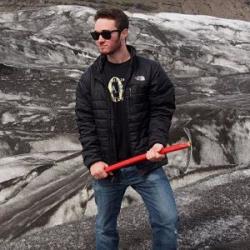Marine plastic pollution and what it means for Iceland
On June 28, the 5 Gyres Institute sailed into Reykjavík following a three-week expedition during which they collected marine plastic samples from Bermuda to Iceland. Led by half-Icelandic Research Director Dr. Marcus Eriksen, a super-crew consisting of 13 advocates, sailing experts, artists, journalists, students and others set out with the goal of researching the North Atlantic and subpolar gyres.
Gyres are large rotating ocean current systems that accumulate what is estimated to be hundreds of thousands of tonnes of plastic that makes its way into the world’s oceans. Few would be better suited to carry out this research than the 5 Gyres Institute, as they are the world’s first organisation to conduct research in the five major gyres, which include the North and South Atlantic gyres, North and South Pacific gyres and the Indian Ocean gyre. The findings of this research expedition, which included taking ocean samples in the subpolar gyre just south of Iceland and also taking beach samples in Vík and Selfoss, indicate that Iceland is suffering from the same plastics problem that affects nearly every corner of the world’s oceans. Each sample taken during 5 Gyres’ expedition revealed surface and subsurface microplastic pollution. These findings reveal that Iceland is inextricably part of this global issue.
The Cycle Of Synthetics
It’s no big secret that the oceans are teeming with trash. Because of ocean currents and non-biodegradable plastics, a straw you tossed on the ground could find its way around the world’s oceans before too long—and it will have plenty of other plastic to keep it company. Due to degradation by the sun, chemicals, and hungry sea creatures, plastics can be broken up into salt-and-pepper size particles that can create sort of a film near the ocean’s surface. Over the course of their journey, the research crew found everything from gnawed Styrofoam cups to small action figures and countless microparticles. While many people would acknowledge that this plastic pollution leads to far more unattractive beaches, what may be less well known is that it has health implications for humans as well.
According to Marcus, marine plastic pollution is already affecting human health. “Once plastic hits the ground, it becomes more toxic over time,” he says. “So, very quickly, one small particle of plastic in the ocean is absorbing pesticides, industrial chemicals, hydrocarbons—all this stuff that sticks to plastic in high concentrations.” Marcus points out that one scientist found that a single particle of marine plastic can have up to one million times the concentration of these pollutants than ambient seawater does.
Additionally, the pH in the stomachs of fish and other ocean creatures is very different than that of ambient seawater. “So all those different things going on in fish stomachs can pull the toxins off the plastics,” Marcus says, “and what we’re finding is that fish store these toxins in their tissues and organs. So if you’re eating a fish that ate a fish that ate plastic that came from a plastic fork that you dropped on the ground five years ago, you’re eating your own trash.”
What Needs To Be Done
When it comes down to it, 5 Gyres’ research shows that we cannot remove ourselves from this cycle of trash. When we pollute the environment—whether this manifests as a Pacific garbage patch the size of Texas, trash-filled coastlines in Southeast Asia or even the Icelandic fish that have ingested these chemicals that we then consume—the pollution inevitably has human consequences as well. Marcus stresses that the most effective way to address this problem is by targeting the source.
“It’s ridiculous that we take a material that’s designed to last forever and make a product that’s designed to be thrown away,” he says. “And that kind of stupid use of that material is what’s creating these islands of trash in the oceans.” For instance, 5 Gyres has led a hard-fought campaign against the exfoliating microbeads found in skincare products. These exemplify single-use plastic—worse yet, a product that is actually designed to be washed down the drain—and these too end up in the stomachs or even circulatory systems of marine creatures. Marcus emphasises that we as consumers need to make our voices heard and demand that companies practise better product stewardship. By shifting away from microbeads and other single-use plastic products, companies are capable of making a difference—and we, the consumers, have the power to nudge them in that direction.
5 Gyres’ research demonstrates that Iceland is already being affected by marine plastic pollution. “We’re just going to see more of it, going to start finding plastic particles and their associated toxins in the food that Icelanders harvest,” Marcus says. He strongly encourages Icelanders to take part in the global movement to address this problem. “What you buy and what you throw away is part of a global system of consumerism. And Iceland can set a standard for the world to follow by not consuming products that have no plan for their disposal.”
Regardless of whether Icelanders make this choice, however, Marcus reminds us that “the trash is coming to you anyway. It’s going to be on your beaches, in the food you eat, and in the fish you harvest and sell around the world. We’re already seeing it happening, and if you look closely, you might see it here.”
—
Fight Plastic Pollution!
According to the Ministry of the Environment, Icelanders throw out 70 million plastic bags annually. Take action by participating in No-Plastic Saturdays, or simply bringing reusable bags whenever you go grocery shopping.
Check out 5gyres.org and sign their petition for a ban on microbeads.
Join the Plastic Beach project which documents plastic levels on beaches.
Join the iTrawl program and collect marine plastic data yourself.
Apply to go on the next 5 Gyres voyage!
Be a diligent recycler, a smart consumer and don’t litter.
Buy subscriptions, t-shirts and more from our shop right here!





























